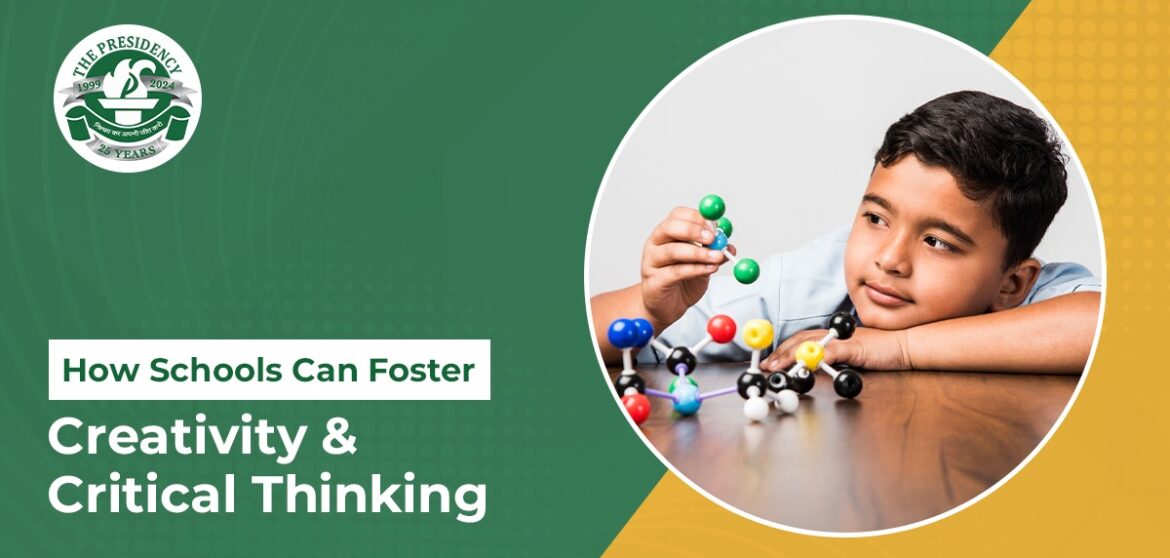How Schools Can Foster Creativity And Critical Thinking
Education—What is it, really?
At its core, education is about teaching & training, but its meaning goes far beyond that. Today, education is not just about memorizing facts & passing exams; it is about preparing students to think independently, solve problems & come up with new ideas.
In today’s fast-changing world, students need skills that go beyond textbooks & schools play a crucial role in fostering creativity & encouraging students to think critically about the world around them.
When students are taught creativity and critical thinking in education, they become better at problem-solving, decision-making & adapting to new challenges. Other than this, encouraging creativity helps students express their ideas freely, while critical thinking enables them to analyze situations logically; together, these skills prepare students for future success, whether in academics, careers or everyday life.
To better understand how schools can nurture creativity and critical thinking, let’s explore the key points below.
• Encouraging Open-Ended Learning
One of the best ways to promote creativity and critical thinking in education is to encourage open-ended learning. Instead of just giving students a set answer to memorize, teachers can ask questions that require deeper thinking. Open-ended questions allow students to explore multiple solutions, develop their reasoning skills & express their unique perspectives.
For example, instead of asking, “What is the capital of Uttarakhand?” teachers can ask, “How do you think living in a capital city might be different from living in a small town?” Such questions encourage students to analyze, compare & think beyond the obvious, making learning more engaging & meaningful.
• Using Storytelling & Imagination
Storytelling is a powerful way to foster creativity in schools. When students are asked to create their own stories, they use their imagination, think outside the box & develop communication skills. Schools can introduce creative writing exercises, drama performances & storytelling sessions to help students express their thoughts in new & unique ways.
Additionally, reading & discussing different kinds of stories help students understand different perspectives & develop empathy. This not only enhances their creativity but also strengthens their ability to think critically about characters, events & moral lessons.
• Promoting Hands-On Activities & Projects
Creativity grows when students have the opportunity to explore & experiment. Teachers can foster creativity in schools by including hands-on activities such as science experiments, art projects, role-playing exercises & group discussions. These activities not only make learning fun but also help students develop critical thinking & teamwork skills.
For instance, in science classes, instead of just reading about how plants grow, students can be given the task of planting their own seeds & recording observations. This method helps them think logically, make predictions & analyze results, all of which are important steps of how to improve problem-solving skills in students.
• Encouraging Curiosity & Questioning
A curious mind is a creative mind. Schools should create an environment where students feel comfortable asking questions. Teachers can foster curiosity by encouraging students to explore topics that interest them, conduct research & present their findings to the class.
When students are encouraged to ask “why,” “what if,” & “how,” they develop critical thinking skills & learn to question information instead of just accepting it. This habit of questioning helps them understand subjects more deeply & apply their knowledge in real-life situations.
• Creating a Safe & Supportive Learning Environment
Creativity and critical thinking flourish in an environment where students feel safe to share their ideas without fear of being judged. Schools should promote a culture where students are encouraged to express their opinions, experiment with new ideas & learn from their mistakes.
Teachers play a crucial role in building students’ confidence. Instead of only praising correct answers, they should also appreciate effort & creativity. When students feel valued for their ideas, they become more willing to take intellectual risks & develop innovative thinking skills.
Final Thoughts
Education is most effective when it goes beyond memorization & encourages students to think, explore & create. By exploring the pointers mentioned above, schools can help students develop essential skills for the future.
At The Presidency International School, we believe in creating a learning space where creativity and critical thinking are nurtured. That’s why by encouraging students to think independently & explore their ideas, we help them prepare for a world that values innovation, problem-solving & lifelong learning.


